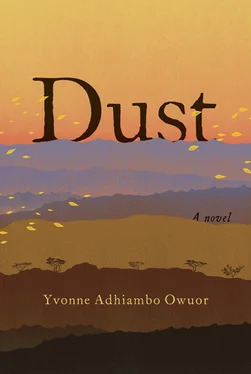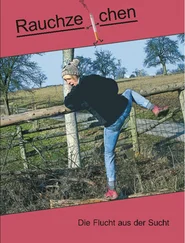Kills a white cockerel to appease an unknown, malignant ancestor. She is praying for more shadows, and her patron saint, Moses Ebewesit Odidi Oganda. Some warn her of the times in which they live: “Others, too, are lost,” they say.
She listens.
“Many are dying.”
She listens.
“Nothing special about you.”
“He’s my brother,” she says.
“Others have brothers, too.”
“This one’s mine.”
Good evening, Ms. Oganda?
Good evening, Jos .
One day, in Baba Dogo, Ajany becomes a face in a mob staring down at a man shot in the head by policemen for impersonating a policeman. A man in a blue-and-red shirt laughs and points at the bleeding corpse. No one to affirm dignity in the bleeding out of a former man.
She starts to sob aloud.
She runs away.
Stumbles across the railway lines into a now familiar space. There is Gloria’s God Gives’s buxom owner.
“Babi!” She screams at Ajany.
Ajany, wiping her face, thinks, Shitty city .
Good evening, Ms. Oganda?
Good evening, Jos .
Next day, she peers into and out of misshapen shelters that are cafés, restaurants, temporary morgues, clinics with discredited doctors, medicine men, exorcists from Lubumbashi, Lagos, and Mombasa. Pornographic video dens, brothels, churches, bars — spaces of encounter and paradox.
Reads the name of a nearby butcher shop: Soma Lebo.
Chapped lips, bitten through. Bad habit.
A story-less day.
Good evening, Jos .
Jos is gesticulating madly, nose wrinkling, eyes rolling, pointing at a bespectacled, well-aged man with straight eyebrows and a squarish head, whose large hands are leafing through a women’s magazine.
The man sees Ajany, smiles, flips a couple of pages before tossing down the journal. Soft-voiced. Luo-tinged English, a husky but clear articulation of words, a downward-shifting cadence with sibilant sounds enphasized. “Apparently, green is the new black.” He rises and stretches out his hand. “Assistant Commissioner of Police Petrus Keah, and I’m ahead of my time.” He lifts his trouser leg to reveal lime-green socks.
Ajany looks up at the big, very tall man, in his oversized dark-blue designer suit. Arms like giant boat oars, a large face, hard bloodshot eyes behind metal-framed spectacles.
Contrived insouciance.
Petrus says, “How’s your father, my brother Wuod Oganda?”
Ajany, head tilted, asks, “What’re you to him?”
“Friend of the family.” Petrus’s brows gather.
Ajany, light-headed: “Something’s happened.”
“No, just looking for you.”
Fainthearted: “Why?”
“For your father.”
“What’s happened?” Break in voice.
“We shared time, a room, and a cigarette, long ago. Ah! Your friend the youthful Ali Dida Hada”—Ajany whirls—“wanted me to give you his salaams.…”
Sweat beads on Ajany’s face; she tugs at her sleeves until they cover her hands.
Petrus watches her, moves closer. “ Nyar Oganda, we’re very concerned. Correction, I’m concerned. This.” He retrieves a folded document. With a shake it unfolds. Odidi’s image.
Ajany breathes in slow sips. “So?”
“Why?” asks Petrus.
Ajany sits down, her knees shaking. “I’m looking for him.”
“The truth is not as you saw it?”
She stares at Petrus. Ice-voiced, she says, “No.”
Petrus looks at her above his spectacles. Her smallness, her defiance, questions that furrow her forehead. “Go back home, nyako .” He sighs. “No truth here’ll set you free. Go, rest.”
A sliver of insight from Petrus’s pitying look —was it madness to want to build a bridge into Odidi’s underworld? Ajany glances away, hands touching the place of the sheet of sorrow that covers her heart and cohabits with the shard of shame that she was still alive.
Petrus savors the end of the unlit cigarette, the illusion of smoke to battle a nicotine craving. A pang. Ajany’s presence is like an accusation. He had raced out when he heard a dispatch about a gang being accosted on Nairobi’s streets. How had he been bypassed? Such accosting was usually his prerogative. He had reached Odidi’s side seven minutes after the bullets that mortally wounded him had been fired. Am I too old for this?
Petrus had reached retirement age eight years ago, but ever since then, he would ignore all requests to submit a retirement date. He could. Kenya regimes had come and gone, but Petrus had stayed around long enough to build cauldrons of knowledge about the sins of many, including those who tried to threaten the continuation of his work life. His targets were paralyzed by his genial unpredictability and the intimate knowledge he brooded over, which, as he explained when date-of-retirement issues were suggested as a meeting agenda item, would hatch, soar, and circulate worldwide in the event of his untimely retirement, death, especially by accident, “mistaken-identity” shootout, poisoning, or sudden illness. Silence afterward. Yet ever since he had reached Odidi just in time to see him die, an unexpected sag in the heart and a persistent inflow of sorrow were driving him to accept his own decline and increasing irrelevance to the only life that he knew. A quick glance sideways, mouth downturned. But he had so much to offer. Petrus throws back his shoulders, flicks his soggy cigarette stick into a bin shaped like a goose, pulls out a rumpled, red cigarette package and reads the warning: Cigarette smoking can kill a fetus . He eases out another cigarette. Doesn’t light it. Dangles it in his mouth. “Why?” he finally asks.
Ajany says, “He’s my b-brother.”
“And you, naturally , his keeper.”
Ajany buries her head in her arms. “He’s my brother.”
Petrus moves near her. “Do you understand what you’re trifling with, Ms. Oganda?”
Petrus pushes at the space between his eyes, pushes at the feeling that besieges him more often now — that of being a minuscule bit actor in an invisible force’s movie. A quiver. Odidi . A stabbing sensation accompanies his recollection of the young man’s wasted blood.
Stupid boy .
Over a year and a half back, a matatu tout informant he was squeezing for information about a spate of robberies in the city had told him of an urban gang named Jokadhok, all-purpose criminals who were the forerunners of the city’s cyber-crime networks. They made the police look foolish. Petrus knew that some of his officers had likely been compromised. That was always the case. Petrus had evolved a profile and acquired a grumpy respect for the criminals. He soon had a grainy picture from an ATM heist, and connected the image to that of a man gone amok who years back had damaged the dam authorities’ offices: Moses Ebewesit Odidi Oganda.
Petrus had at once sought out Ali Dida Hada to deliver a warning to the Oganda family, which he did. But, to Petrus’s shock, a face that had plagued his forty-year memory had sought him out to plead for his son’s life. Aggrey Nyipir Oganda came to the city he had sworn off, to fall on his knees in Petrus’s office.
“Save my boy,” he said, through tears falling into deformed hands, which he, Petrus, had reshaped. “You can save my only son.”
Petrus had fled Nyipir that day, escaped the re-emergence of violent memories, of doubt, of the accumulated voices of a thousand bleating citizen-victims.
Crinkle of cigarette pack.
Petrus glances at Ajany.
Does she know this part of the story?
She is huddled within her sweater even as rage skulks in her eyes. No , he concludes. He munches on his cigarette.
Читать дальше











